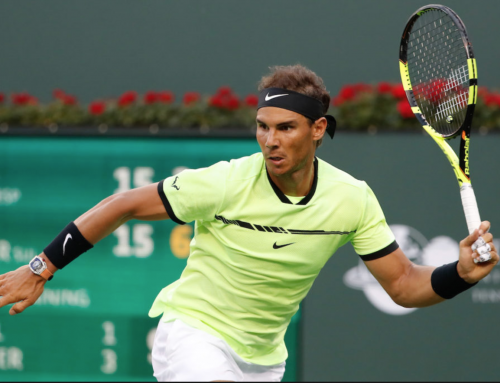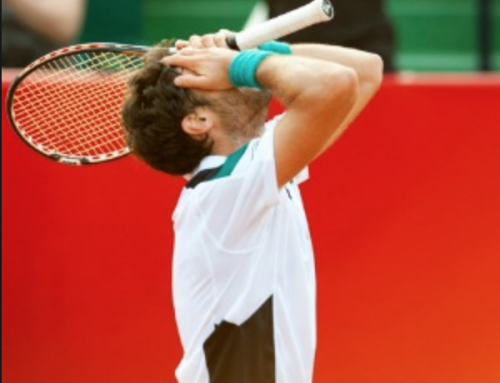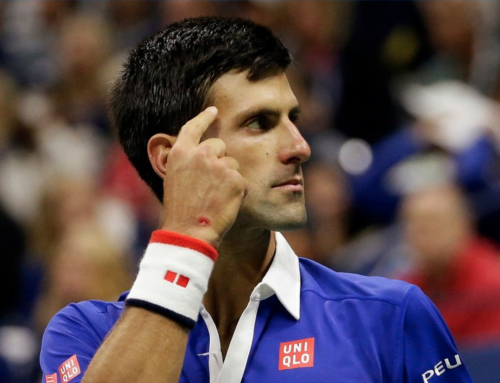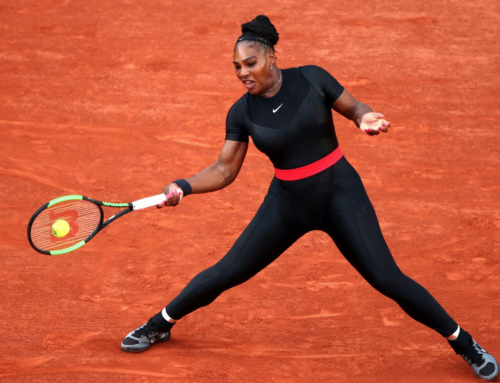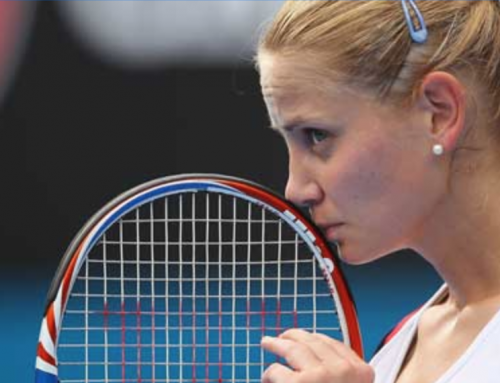On today’s show Ian talks about the three essential technique elements to hitting an effective drop shot. Make sure you’re doing all three! He also discusses managing a partnership within a doubles match. What should you do when your partner is missing easy shots and getting upset? How about when it actually starts affecting your own concentration and play? Find out!
Download Transcript: Word Doc | PDF | Kindle | Text
Welcome to the Essential Tennis podcast. If you love tennis and want to improve your game, this podcast is for you. Whether it’s technique, strategy, equipment, or the mental game, tennis professional Ian Westermann is here to make you a better player. And now, here’s Ian.
Ian Westermann: Hi and welcome to the Essential Tennis podcast, your place for free expert’s tennis instruction that can truly help you improve your game. Today’s episode of the episode is brought to you by Tennis Express and Tennis Tours. Thanks very much for joining me on today’s episode. We’ve got some great topics to talk about, and before we get to those, I want to let you all know that in next week’s show, episode number 164, I’m going to have a big announcement to make. It’s something I’ve been looking forward to for a long time, and I’m really excited about it. I’m going to kick off next week’s show with that.
Some of you out there listening already know what I’m talking about, but I haven’t really made this public yet. You’ll just have to wait until next week and see, but I’m looking forward to next week’s show. I just want to put a little bug in all of your ears that it’s going to be an important announcement next week. So let’s go ahead and get to the show. Sit back, relax, and get ready for some great tennis instruction.
Let’s kick off today’s show with a question from Asan, and Asan is writing to us from Iran. He wrote and said I’m 28 and a level 4 player. I’m tall and have a great serve. My former partner went to the USA, so I found a new guy to team up with. Everything was okay, but in matches my partner could not finish easy points after my serve. He has the ability to do it, but became angry at himself more and more. I told him to take it easy. We will go for the next point, etcetera, but after 3 or 4 bad volleys, I could not serve well anymore and could not follow the rhythm of the match. I tried to recover from this during the match but could not.
So I have a question. What should you do in doubles when you see your partner does not finish your serve or easy volleys or in general he frustrates you? By the way, we have practiced this technique a lot, but in matches I don’t know what happens to him, and I do not know what I should do when this occurs.
Okay, Asan, that’s a really good question. Basically we’re talking about kind of a combination of mental toughness and doubles partner relations. It’s really important that you get along well with your doubles partner. In fact, it’s extremely important. You two are a team out there, and if you can’t work together as a team, then it’s very difficult to be successful. So we’re going to talk about that, and we’re going to talk about your question from two different perspectives.
The first perspective from your partner’s standpoint, your partner’s vantage point, and two different topics from your vantage point as well. So let’s talk about your partner first. I’m going to give you a couple of different tips on what your partner needs to work on, and hopefully you can help him through this or simply have him listen to this episode so he can hear me talk about what he needs to work on here. In fact, that would probably best if you could have him listen to this show. It probably would be easier than trying to teach him yourself. Some people would be receptive to that. Other people would not want deep advice from their doubles partner. They would probably push that away. I don’t know your partner, so I don’t know how he would react. Best case scenario would be to have him listen to this show.
So two things that your partner needs. Number one, he needs more competitive practice based on what you’re writing to me. This goes for all of you listening. Anytime you can complete something successfully and practice but you cannot do it in match play, it means that you need more competitive experience. You need more competitive practice.
Practicing and competing are really two different skills completely. Many of you out there have been frustrated by this. Maybe you’re working on a new technique of some kind or a new strategy or tactic, and you had out to the practice courts and you hit with a ball machine or with a practice partner or maybe with your tennis coach or pro. Everything feels great. It’s like ah, awesome. I’ve got this finally, maybe working on it for a little while. Then you go out to play a match a couple days later or the next week, and it’s just totally not there. It just totally leaves you, and that can be really frustrating because you feel like you’ve got it. You feel like it’s part of your game.
And this example that Asan is talking about — in this example, they were practicing a certain tactic. Asan has a great serve, and his partner in practice was able to put away the easy volleys and overheads that were the result of Asan’s good serve. Then they got into competition in match play, and it was no longer happening. He was missing those shots. If that becomes a pattern, then your partner Asan needs much more competitive practice.
Once you’ve mastered a shot or a technique or a strategy in practice, it takes really just as many repetitions in match play before you can confidently use that tactic or strategy or technique in match play. What it comes down to is you really have to believe that you can do it when it counts. If you’ve done it in practice, that’s one thing. But in the back of your mind you know, I had a great day at practice. I was finally able to hit that topspin forehand. It felt great. And you know that you are able to do it in general, but there’s still some kind of that little doubt in the back of your mind whether or not you can do it when something is actually on the line. And it’s a match that counts and you really want to win and perform well.
So, Asan, this is something that you can directly help your partner with. Set up practice sessions with two other players that are right around your level and play as many points as possible. Keep track of score and make it a competition and practice putting your partner in this situation over and over again where it actually counts. And if he’s open to it, even put something on the line. Not only play for points, but say whoever wins this set, the losing team has to do with 20 pushups. Something like that where it’s not a huge deal, but put something on it so that there’s some pressure there.
You can help your partner work through dealing with these shots when it actually counts for something. So that’s number one for your partner. He needs more competitive practice. Number two for your partner, and this one is more difficult. He needs to let misses go. He needs to start dealing with his misses more maturely I guess is probably a good word for it. You can try to help him on this, but at the end of the day its relay up to him whether or not he’s going to change his attitude about this. Whether or not he’s going to change his mindset and his emotional kind of patterns out on the tennis court. That’s something that’s not easy.
So be patient with him. Cut him some slack on this. If you want, and I’ll suggest that you talk with him about it. Make it a casual meeting. Maybe after a practice session. Maybe the two of you are cooling down, packing up your stuff or stretching or whatever. Don’t make it like an intervention or anything like that, but casually just bring it up. Just say that in general, hey listen I think that you and I can be a better team. We can be more successful if you learn how to keep your head a little more in and not get so upset and frustrated during our match play when you miss.
Just bring it up in a really low pressure way, kind of suggestive way. Don’t be condescending. Don’t talk down to him and act like you’re so much better than him, that you need to try to fix his game kind of thing because of you come at it from that kind of direction, he’s probably going to shut down and not going to listen to you.
Bring up a couple of things. First of all, making mistakes is totally part of playing tennis at any level. I don’t know this for sure, but I’m going to say that no player has ever completed a full tennis match without making some kind of unforced error, without making some kind of mistake. Professional players included. So it’s totally unrealistic to expect to go through a match and not screw up. Now of course some days you screw up more than others, and that can be frustrating. But in general, you need to learn how to let your mistakes go. Just let it roll off your back and just not be worried about it.
Winning at tennis isn’t about making no mistakes. It’s not about being error free. Winning tennis is all about which team rebounds from making those errors and then plays the best after that, and learns how to make adjustment, and does the best that they can within whatever confines they have for that day.
Then lastly, I would just say encourage him to stay positive in your next match no matter what. At the end of this conversation say, tell you what just for me just try. The next match that we have together, I want you to just do your best to stay positive no matter what happens. It doesn’t matter if you swing and miss at an overhead, a sitter overhead, you totally miss it and then fall over and fall on your face. Something totally embarrassing. You’re going to get up and kind of smile, laugh it off, and just move onto the next point. And ask him to just kind of make a commitment to do that in his next match. If you can get him to at least try it and make that first step to be a little bit more positive, then the two of you as a team will definitely advance.
So that’s what I suggest for your partner. Number one, he needs more competitive practice. Number two, he needs to let his misses go. Not let them bother him so much. Now for you, Asan, you need to work on some things as well based on your question here. First of all, you need to support your partner 100%. 100%. Never be negative. Never show disappointment. Every time he misses a shot, you should jog up to him, slap his hand, give him five, say hey don’t worry about it. Good try. This was the right play. Maybe he went and tried to poach, missed a shot. Or maybe he had that easy put away shot after your good serve and misses it.
Say hey, that was the right play. You should keep going for that. Don’t worry about it. No problem. Just forget about it. Go for it next time you get the opportunity as well. Be totally positive. Asan said in his note that he tried this, but over time he just kind of wore down. And he got frustrated. Well, you have to do your best to stay positive no matter what, Asan, and that can be really difficult when your partner is being negative. But you just have to do it no matter what. Even if you’re down love 6, love 5, and your partner just threw his racket in upset, still try to say upbeat. You never know in tennis when things could totally turn around and the two of you could make a comeback, but that’s not going to happen if the two of you continue to be upset and negative and angry in general. You’ll never make that comeback. So 100% you need to support your partner.
It’s just like managing any other successful partnership in life, a marriage, a work relationship, a dating relationship if you’re not married yet. You need to have each other’s backs, and you need to support each other unconditionally. You have to be a team 100%, and if at any point you give up on your partner, it’s just not going to work out well for you that day.
And lastly, Asan, you need to learn how to focus when in general things are just not going your way. This is kind of related to supporting your partner 100% no matter what. But it’s a little different. You need to learn how to keep your concentration. You talked about in your question losing the rhythm of the match, starting to lose your serve and not being able to hit your serve effectively anymore, etcetera. You have to learn how to put away the frustrations or the temptation to frustrated by your partner and be positive and mentally tough and keep your focus.
This is part of doubles. You have to not only deal with your opponents and try your best to keep your focus no matter what they’re doing, but you got to deal with your partner sometimes too and stay positive for the two of you and keep your focus and keep doing the best that you can at what you can control, your game and what you can control, supporting your partner, etcetera.
So don’t show disappointment. Don’t let your partner’s misses affect you. Don’t let your partner’s attitude affect you. If your partner starts getting angry and negative and you follow, then the day is over. So you have to stay tough. This is just good mental training. This is good life training honestly. No matter what happens out there, you just have to do your best to stay positive, stay focused, and do the best that you can.
Remind yourself that this is just a game. You’re out there playing a game for enjoyment and you love tennis. This is exactly what you want to be doing right now. Remind yourself of that to just kind of keep positive emotionally and stay up. Just have fun out there. Don’t worry about it. Remind yourself it’s just a game. Remind yourself that you love to play tennis. You love to compete, and you’re just going to decide. Just make a decision to relax, enjoy it, and just do the best you can right now.
You kind of have to learn how to sometimes just laugh at the challenges, laugh internally. Just chuckle to yourself that your partner is having such a terrible day today, and he’s just really negative and angry and missing these easy volleys. Well you know what, things could be worse with life, right? I mean, am I right? Don’t worry about it. Don’t let it drag you down emotionally. Don’t let it take away your concentration. Just keep doing the best that you can right now with the circumstances you’ve been given so that when you walk off the court, you can still be satisfied and say you know what, I had a lot going against me today, but I stayed focus. I still did the best that I could, and even though we lost that match and my partner was angry and upset, I still feel good about how I performed. Doesn’t mean you’re going to win every time, but that’s just part of competing at sports.
Asan, hopefully that’s helpful to you. This is a really tricky situation. Hopefully you can get your partner to listen to this show. If not, hopefully my advice here has been helpful to you and you’re able to take some of these ideas and go talk to your partner and get the two of you on the same page. Hopefully get him a little more positive. Keep yourself more positive. Keep yourself more focused, and the two of you will definitely be more successful. Thank you very much for being a listener in Iran. Great to know I’ve got listeners there and best of luck with your tennis.
Alright, real quickly before we get to our second question today, I want to remind you all about the official sponsors of the Essential Tennis podcast. First of all, TennisTours.com where you can go to purchase tennis tournament tickets for ATP and WTA events and travel packages. Go check them out. They’ve got tickets to all the grandslams and most of the other major events, professional events, throughout the year. So go to TennisTours.com and when you check out, use the promotional code Essential. You’ll get a discount off your purchase, and that’ll show them that you’re a listener and you support Tennis Tours for being a sponsor of the Essential Tennis podcast.
Also, Tennis Express, one of the biggest online retailers in the world for tennis gear and equipment. Please check them out by going to EssentialTennis.com/Express. That’ll automatically shoot you over to Tennis Express, and when you check out any purchase you make, a small percentage of that will come back to support the Essential Tennis podcast, which I would appreciate very much. So thank you to my sponsors TennisTours.com, TennisExpress.com, and thank you to all of you who have been going and supporting them with your purchases to show them your appreciation. That really means a lot to me.
Next question here on the show is from Robert in Sweden. Robert wrote and said, my question has to do with drop shots. I struggle with my drop shots as they always come out to long and land at the service line. Can you give advice on effective drills to train drop shots?
Well, sure Robert. As far as drills are concerned, you should be practicing for two bounces inside the service line. If you can hit a drop shot that lands too bounces inside the service line, you’re doing great. Three bounces or more inside the service and it’s an incredible shot. But two bounces, you’re probably hitting a shot that if it’s not a winning shot, it’s at least very challenging for your opponent.
In the USPTA exam, United States Professional Tennis Association which is the organization that certifies me as a tennis professional, that’s part of the stroke exam is hitting drop shots. That’s how they judge what level you get certified at is by how many bounces in front of the service line. If I remember correctly, I think we had to hit 10 and something like 7 of them had to bounce twice inside the service line, something like that. I can’t remember what it was exactly, but that’s usually the gauge you can use to tell how well you’re doing.
Keep in mind that in general you don’t want to use a drop shot if you’re deep in the court. You really shouldn’t be trying it unless you’re at least inside the baseline. Preferably probably several steps inside the baseline because the further back you get simply the more difficult it becomes to successfully hit softly and short because you just have a lot more space that the ball has to travel across before it lands on your opponent’s side. That makes it really difficult to drop it short without it bouncing too far, like what you’re describing.
Now with those things out of the way, I’m going to talk about the technique of hitting good drop shots so that I’m sure you understand what you’re supposed to be doing with the racket. This is something I’m pretty sure hasn’t been discussed yet on the podcast, so this will be a new topic.
Basically, hitting good drop shots come down to three essential technique elements. Number one, you need an open racket face meaning that your strings are facing up towards the sky. And depending on where you are on the court, you want your face to be really open at contact, at least 45 degrees angled upwards and opening more than that as you make your contact. When you finish a good drop shot, your strings should be actually facing straight up towards the sky. That’s not where they should be as you make contact, but upon completing a drop shot stroke, you really want your racket face completely open.
How open you want it really depends on how softly you’re trying to hit the shot, where you’re standing on the court. The further back you are, the more open you’re going to have to make it to really make your drop short because the ball has to be essentially on its way dropping already as it crosses the net so that it doesn’t go super far and it doesn’t bounce up and travel further into your opponent’s side than you want to. The closer you are, the more you can get away with having it a little bit more closed, which means that it’s not going to sit up in the air as long, and it’s going to get back down into your opponent’s side more quickly.
So that’s technical element number one is an open racket face. Number two is a downward racket path. This is a high to low racket path. The racket should be traveling downwards as you make contact, and the steeper your downward path is, the more backspin you’re going to make. A drop shot is a backspin shot. It’s a slice shot, and the steeper you come down towards the ball, the more backspin you’re going to make.
In general, I don’t recommend that those of you listening try to make this kind of like a chop shot where you’re trying to create a whole lot of backspin. Your drop shots are going to be most effective if you have good touch and you place it well. Don’t try to hit a good drop shot by spinning it a lot. If you hit it just right, it’ll be an incredible shot if you hit it short with a lot of spin. But when you start coming downwards really steeply and really quickly in order to try to make a lot of spin on purpose, you really just make it much more complicated to control exactly where the ball goes. There’s just a lot more variables to play when you start to really spin the ball heavily. It’s just much more difficult to make consistently.
So I just want to throw that out there. Don’t try to hit an effective drop shot by spinning it a ton. Try to hit your effective drop shot by being soft and placing it well with some back spin. It should be a back spin shot, but we’re not trying to hit an effective drop shot by hitting a whole ton of back spin. So that’s number two, the downward racket path.
Number three, this is probably the most important part. Those of you listening probably already knew one and two. Number three is really important, and that is a relaxed grip on the racket. Robert, it’s my guess that this is probably the element that you’re missing is having a loose grip on the racket. The shorter and softer that you want your drop shot to be, the more relaxed your grip should be. This is a touch shot. This is a feel shot, and you’ll have no touch or feel if you have a tense, tight grip on the racket. So be loose and relaxed, open the face up smoothly, and let your racket come downwards to come underneath the ball as your face is opening to come underneath the ball and make a little bit of backspin.
Exactly how high you want the ball to travel, how short you want it to land, and how much spin you want to be on the shot is all going to come down to those three elements. The open face, the downward racket path, and the relaxed grip on the racket. If your shots keep going deeper than what you want, Robert, if the ball keeps landing on the service line, it’s either going to be that your face is too closed — and watch the path of the ball on this. There should be an arc to the shot.
The ball should come up softly and then drop down softly. If the ball travels relatively straight over the net and there’s no arc to it, then you’re never going to really be able to drop it very short because as I mentioned before, the point here is we actually want the ball dropping down towards the court again before it even gets to your opponent’s side. And if you hit the ball straight and it starts dropping before it gets to your opponent’s side, it’s probably going to hit the net.
So you have to open your face up to get the ball up in the air at least a little bit. Not so much that it sits up and floats and it’s easy for our opponent to get to, that’s obviously not what we’re going for. But that’s where the touch comes into play. So watch the path of the ball. If the ball is traveling relatively straight, you need to open your face more. That’ll help you get the ball shorter in the court. If you have the arc and it’s curving, it’s dropping down but it’s just popping up way too high and it’s traveling too far in the court, then you need to relax and soften your grip. Without that, you’ll never be able to hit this very affectively or very short.
So again, touch shot, open racket face, downward racket path, relaxed grip on the racket. That’s how you can hit the best possible drop shot. This is something I should really do a video on soon, a little tutorial video to show you all how to do this and how to practice it. That’s a great question Robert. Thanks very much for writing in from Sweden. Appreciate you being a listener, and let me know if I can help you any further.
Alright. That does it for episode number 163 of the Essential Tennis podcast. Thank you very much for listening to today’s show. I really appreciate it. In wrapping up today’s episode, I’m going to read just one quick comment that was left on last week’s show when I had Will Hamilton of Fuzzy Yellow Balls on as a guest.
That comment comes to us from Beth who wrote and said, let me echo Will. Ian, you need to plan a trip out to Indian Wells. He talked about his access as a member of the press to the courts and to the players, and it’s always as good for the random shmoe. Most of the video I shot was from about 8 or 10 feet away from the players. Not just practice, but even some of the matches on courts 4, 5, or 6, you are also right next to the players. I got hit by balls twice, she says.
Alright, well you know what I’m planning on going out to Indian Wells next year for the tournament. I’m really, really looking forward to it. I’ve actually been in Palm Springs twice kind of right down the road from where the tournament is. I’ve done two Essential Tennis clinics there, and plan on doing a couple more before the tournament next year. So keep your ears open for that.
I plan on going to the BNP Paribas Open next year hopefully as press just as Will has been doing, but even if I can’t get press access, which hopefully I can, I plan on going just as a spectator to watch because all I hear is how awesome that event is and how close you can get, etcetera. And it’s just a high level event now. All the best players in the world are there. Especially with the doubles this past year. It was awesome. All the top, I think everybody in the top 10 actually played doubles, which is incredible. I’m not quite sure why that happened, but I would’ve loved to have seen more of those matches and seen them in person. As I talked about in previous podcasts, completely different than watching on TV.
So, Beth, thanks for your comments, and if you like to leave a comment on today’s show either on the doubles partner management or drop shot technique, simply go to EssentialTennis.com/podcast, click on episode number 163, leave your comments or thoughts or questions. I read all of those and do my best to reply to all of them as well. I look forward to seeing your thoughts on today’s episode. So until next week, take care everybody and good luck with your tennis.



